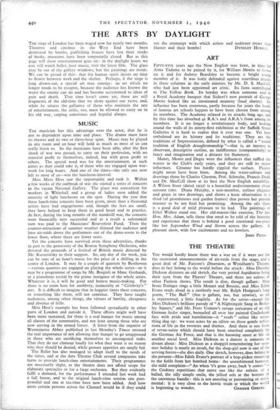MUSIC
THE musician has this advantage over the actor, that he is not so dependent upon time and place. The drama must have its theatre and its two or three-hour span. Music may be played in any room and an hour will hold as much as most of us can really listen to. So the musicians have been able, after the first shock of war was passed, to carry on their profession, with no material profit to themselves, indeed, but with great profit to others. The special need was for the entertainment, at such times as they could take it, of those who are engaged upon war- work for long hours. And one of the times—the only one now left to most of us—was the luncheon-interval.
Miss Myra Hess saw the opportunity and took it. Within a few weeks of the outbreak of war she started a series of concerts in the vacant National .Gallery. The place was convenient for workers in Whitehall and a group of ladies soon added the amenity of light luncheons on the spot. During the year that these lunch-time concerts have been given, more than a thousand artists have had engagements and, though the fees are small, they have helped to keep them in good heart and in practice. At first, during the long months of the standstill war, the concerts were financially very successful and as a result a substantial sum was paid to the Musicians' Benevolent Fund. Then the counter-attractions of summer weather thinned the audience and later air-raids drove the performers out of the dome-room to the lower floor, where there are fewer seats.
Yet the concerts have survived even these adversities, thanks in part to the generosity of the Boston Symphony Orchestra, who devoted the proceeds of a festival of British music directed by Mr. Kussevitsky to their support. So, any day of the week, you can be sure of an hour's music for the price of a shilling in the centre of London. It may be a couple of quartets by Beethoven —various quartets are engaged on playing the whole series—or it may be a programme of songs by Mr. Borgioli or Mme. Gerhardt, or a pianoforte recital by the prime instigator of the whole series. Whatever it is, it will be good and honest music-making. For there is no room here for snobbery, insincerity or " Celebrity's " airs. It is difficult to imagine that in happier times these concerts, or something like them, will not continue. They have taught audiences, among other things, the virtues of brevity, cheapness and absence of frills.
Miss Hess's example has been followed sporadically in other parts of London and outside it. These efforts might well have been more sustained, for there is a real hunger for music among all classes of the community, and not least among those who are now serving in the armed forces. A letter from the organist of Westminster Abbey published in last Monday's Times stressed the real importance of not allowing that hunger to go unappeased in those who are sacrificing themselves to uncongenial tasks. That they do not clamour loudly for what they want is no reason why they should be denied, while grosser appetites are amply fed.
The Ballet has also managed to adapt itself to the needs of the times, and at the Arts Theatre Club several companies take turns to provide lunch-time entertainments. Their programmes are necessarily slight, as the theatre does not afford scope for elaborate spectacles or for a large orchestra. But they evidently fulfil a demand, for the performance I attended last week had a full house, and to the original lunch-time session one post- prandial and one at tea-time have now been added. And how cross certain persons across the Channel would be if they could see the contempt with which artists and audience treats their






































 Previous page
Previous page